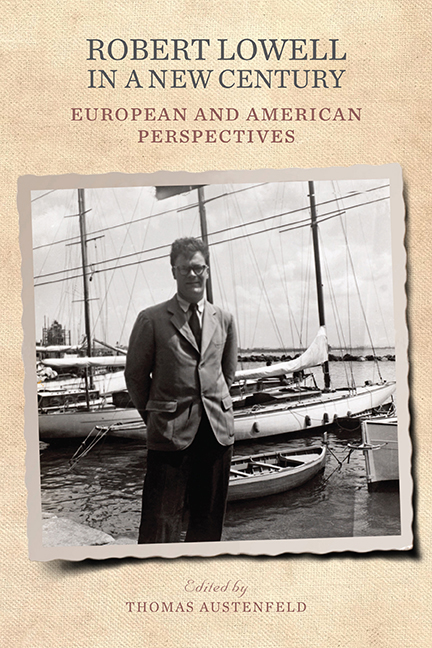Book contents
- Frontmatter
- Dedication
- Contents
- Acknowledgments
- Introduction
- 1 Revisiting Robert Lowell's Mental Hospital Poems
- 2 Sensual Drift and Ethnic Longing in Robert Lowell
- 3 Reworking the Same Water: Robert Lowell Transported
- 4 “Sweet salt embalms me”: A Hippocratic Approach to the Role of the Sea in the Poetry of Robert Lowell
- 5 More Delicate Than the Historian's Are the Map-Maker's Colors: Correspondences between Lowell's Poetics of History and Bishop's Poetics of Space
- 6 Robert Lowell and Ezra Pound's Economics
- 7 Robert Lowell and Ezra Pound in Washington and Rapallo
- 8 “Why Holland?”: Robert Lowell in Amsterdam
- 9 Lowell and Ungaretti: Imitations and Beyond
- 10 Robert Lowell's Credo
- 11 “Marriage? That's another story”: Reconsidering the Marital Trope in Robert Lowell's Poetry
- 12 “Oh No”/“Yes Yes”: Lowell and the Making of Mistakes
- 13 Robert Lowell: The Power of Influence
- Notes on Contributors
- Index
6 - Robert Lowell and Ezra Pound's Economics
Published online by Cambridge University Press: 26 June 2019
- Frontmatter
- Dedication
- Contents
- Acknowledgments
- Introduction
- 1 Revisiting Robert Lowell's Mental Hospital Poems
- 2 Sensual Drift and Ethnic Longing in Robert Lowell
- 3 Reworking the Same Water: Robert Lowell Transported
- 4 “Sweet salt embalms me”: A Hippocratic Approach to the Role of the Sea in the Poetry of Robert Lowell
- 5 More Delicate Than the Historian's Are the Map-Maker's Colors: Correspondences between Lowell's Poetics of History and Bishop's Poetics of Space
- 6 Robert Lowell and Ezra Pound's Economics
- 7 Robert Lowell and Ezra Pound in Washington and Rapallo
- 8 “Why Holland?”: Robert Lowell in Amsterdam
- 9 Lowell and Ungaretti: Imitations and Beyond
- 10 Robert Lowell's Credo
- 11 “Marriage? That's another story”: Reconsidering the Marital Trope in Robert Lowell's Poetry
- 12 “Oh No”/“Yes Yes”: Lowell and the Making of Mistakes
- 13 Robert Lowell: The Power of Influence
- Notes on Contributors
- Index
Summary
IN A POSTSCRIPT to his February 1952 letter to Elizabeth Bishop, Robert Lowell writes of her, himself, and presumably his second wife, Elizabeth Hardwick: “You know we are a unique class, the only three American writers of our generation who don't have to work. Usury has made us; and I can hear Karl Marx muttering out a review to prove that our biases are identical.” He probably refers to his 1947 Guggenheim fellowship money, of which he and Hardwick had still some left, as well as to his and Bishop's trust funds that, by freeing them to an extent from the treadmill of teaching, affected their world views, sensibilities, and writing routines. However, this remark also reveals a rather surprising concern of Lowell's— his interest in money and its relation to poetics. In fact, Lowell's mention of usury raises a more specific question: To what extent was Lowell actually interested in the notorious radical economics of his most important early mentor, Ezra Pound?
Critics have largely neglected this question. They have overlooked it probably because Lowell left relatively few traces of this influence. Naturally, the poet suffered from the same inhibitions that after the war plagued most readers of Pound: he feared that any genuine interest he would allow himself, whether overt or clandestine, would make him seem similarly cranky and infect him with fascism and anti-Semitism.
Few know of a telling dispute Lowell had on this question with the founder of New Directions Publishing, James Laughlin, who was also his former teacher at Harvard and then friend. Their conversation on the subject took place on the evening of January 4, 1973, at a memorial service advertised as “A Quiet Requiem for E.P.,” organized by the Academy of American Poets at the Donnell Library Center of the New York Public Library. That day, the famous editor goaded the poet to confront the question of the influence of Pound's economics more directly than ever.
- Type
- Chapter
- Information
- Robert Lowell in a New CenturyEuropean and American Perspectives, pp. 81 - 94Publisher: Boydell & BrewerPrint publication year: 2019



